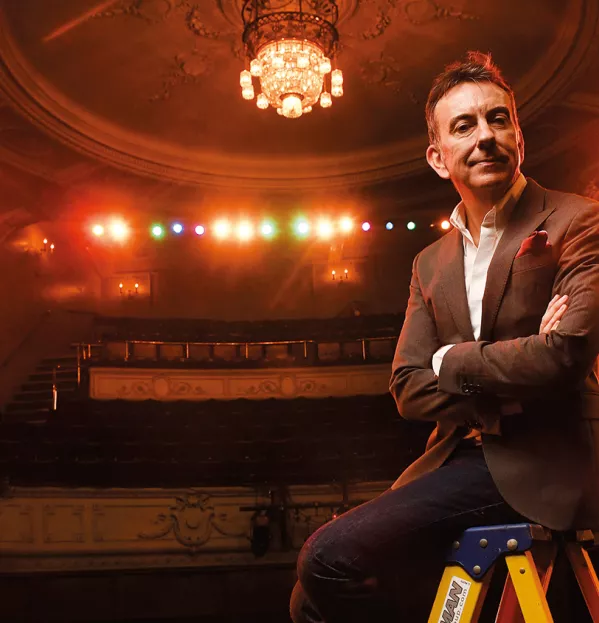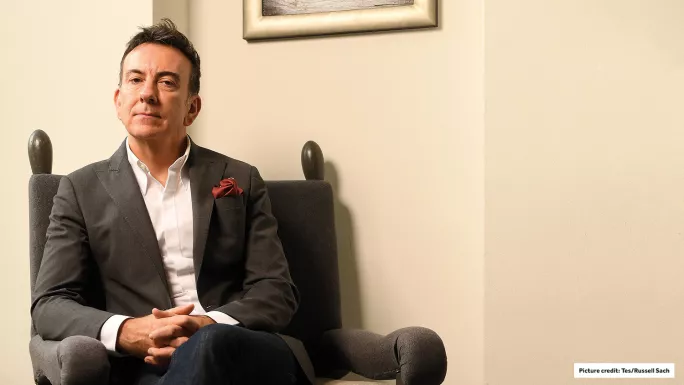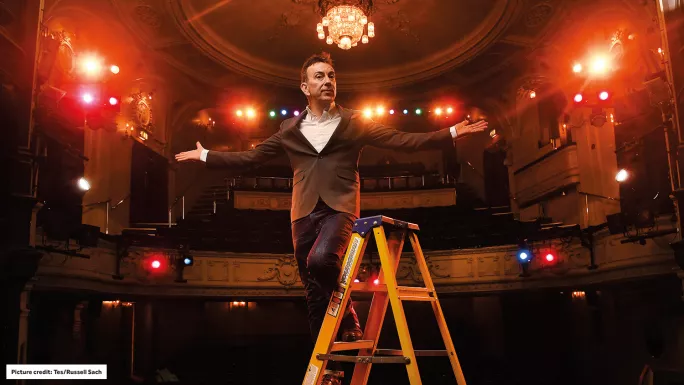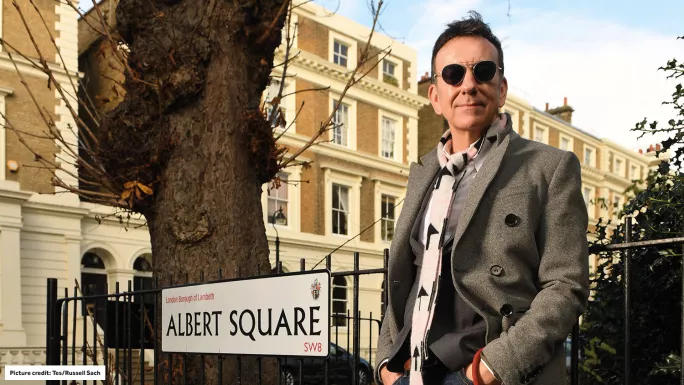
Dramatic pause...

Let’s start by clearing up some confusion: Paul Roseby, chief executive and artistic director at the National Youth Theatre (NYT), does not want schools to stop teaching drama. He was widely reported to have said this during a speech at a London arts conference in 2014, but he insists he was misquoted.
“I don’t propose the teaching of drama in schools be scrapped,” he says. “Quite the opposite. While I think it’s true to say a drama GCSE isn’t recognised outside the education system, I do think drama deserves a higher status in schools - there should be greater awareness of the benefits.”
It would certainly have been odd for Roseby to shun assistance from schools. The NYT is a registered charity that is committed to developing young people through the medium of creative arts; is widely considered the world’s leading organisation of its kind. Schools are integral to its work, as he acknowledges.

“Some people might not be able to quantify the value of drama in schools,” he says, “but it absolutely is valuable.”
The benefits of drama are wide-ranging, he argues, and drama lessons benefit pupils, whether they want a career in acting or not. To prove this, Roseby cites an extensive list of positive outcomes: drama gets the adrenalin pumping; takes young people out of their comfort zone; promotes bravery and creativity; and instils confidence. Children are taught to communicate, debate and listen, too. It also requires them to work with others, with whom they might not necessarily have anything in common, “which of course we all have to do in working life”.
Finally, it leads to heightened self-belief, which Roseby says is “absolutely key” to a young person’s development. Reaping these benefits is more crucial now than ever before, he states, in light of the effects of technology on the younger generation.
“[Modern technology is] detrimental to young people’s ability to communicate,” he says. “It promotes quietness and lack of vocal connection, and leads to children feeling isolated and ill-equipped to deal with things that are bigger than themselves.
“Drama is the antidote to that.”
The qualities instilled by drama are something that Roseby says are being recognised by a new breed of business leader; employability skills, such as problem-solving and public speaking proficiency, are increasingly being sought. And highly valued are those candidates who can display a keen sense of their own identity - and who are not easily intimidated.
“In that sense, learning drama is a mechanism for success,” says Roseby.
He goes as far as to claim drama can even make you a better person - one who will go on to contribute to creating a better society.

“It used to be that young people looked forward to getting a job and buying a home,” explains Roseby, “but it’s practically impossible for all but the significantly well-off to buy a property now. The basic fundamentals of society have been pulled away from under us and young people need an alternative support system to carve their own trajectory. Drama can help engender self-awareness through analysing texts and characters’ behaviours - it enables them to be more flexible in the choices they make.
“Drama [also] gives children the opportunity to discuss the elephant in the room, as well as to ask sometimes challenging questions in an environment they feel safe in.
“Ultimately it encourages young people to explore injustices and to begin to break down social barriers. That’s important when hate crime is on the rise, and at a time when we seem to be building walls rather than knocking them down.”
‘A fragile ecosystem’
Roseby’s desire to sell the merits of drama to such a degree tells you a lot about the current state of the subject in schools: the number of students taking it for GCSE this year dropped by 9 per cent, while its status as a subject in its own right is continually under scrutiny. It is common to blame heads for sidelining the subject, but he thinks that is taking aim at the wrong people.
“I believe the vast majority of heads and teachers absolutely recognise the value of drama in schools - I haven’t met a single one who doesn’t - and I’d never lay blame at their door,” he says. “They do their best to manage what is a fragile ecosystem.”
Instead, Roseby points to the government as the main culprit behind the subject’s downturn in fortunes.
“The culture secretary understands and recognises the value of the creative arts, and yet there remains a cavernous gap between sport and the arts,” he says. “After the embarrassment of Team GB winning a single gold medal at the Atlanta Olympics [in 1996], there was this mass investment in sport. It’s that investment that saw us finish second in the league table in Brazil. It’s been a huge success and there’s real momentum there. I fail to see why that can’t or isn’t being done for the arts.
“The effect drama can have on young people is extraordinary, but the Department for Education isn’t listening. It’s hard enough just to get them to respond to our emails - getting through to them is like trying to get a clear plan behind Brexit.”
A perceived failure of the government to act has led the NYT to take matters into its own hands. “What I’d like to see is drama teachers taking on the role of artistic directors, so that drama becomes a means to teach in every subject in every school,” says Roseby.
In a bid to turn this idea into reality, the NYT is planning a trial that would, it hopes, come to fruition at the end of next year’s summer term. A one-day event is to take place at Kirkby College near Mansfield, which would involve the play Relish - commissioned by the NYT in 2010 and written by former pupil James Graham - threaded throughout the day’s proceedings.
“That play is more relevant now than it was when James wrote it - it touches on many social issues and it ticks all the boxes for what we’re trying to achieve,” says Roseby.
The finer details are currently being drawn up, but the idea is to use the play to promote cross-curricular learning in every lesson and subject during the day. Drama teachers would disseminate parts of the text among colleagues so that it is embraced by every department; this in turn would encourage teachers of other subjects to appreciate the value of drama in the school, and every child to engage with it.

“The aim is to boost the appreciation of drama through shared experience,” he explains. “We could perhaps involve parents by inviting them to be volunteers so that it becomes something of a parents’ day for the arts, too. We hope it will excite and animate.”
The plan, if the trial is successful, would be for the exercise to be taken up by other schools, eventually leading to a “national arts day”, much like a sports day. Ultimately, Roseby hopes that the initiative would not only improve the perception of drama in the education system but also foster an appreciation of the arts in all areas of society.
“The creative industries are fighting the same battles we’ve always fought,” he reflects. “There’s this perception that we’re the weirdos who come out at the end of the corridor once everyone else has gone home. Too often, we’re thought of as second-class citizens. I want this trial to challenge that.”
Mia Hunt is a freelance writer
Applications for the National Youth Theatre’s 2018 acting auditions and backstage interviews for 14 to 25-year-olds are now open at nyt.org.uk/auditions
‘Everyone in the creative industries started their journey somewhere and that somewhere is usually school’
Stuart Worden is principal of The Brit School, Croydon
Again and again, we are hearing young people say that their school is no longer teaching the performing arts, that the school has dropped drama from the curriculum. Everyone, from the theatre industry to the world of television, government and commerce, should be concerned about this.
The cultural industries are now worth £92 billion, which doesn’t happen by accident. We also all know that drama and the theatre is a significant place for expression, to explore ideas, have fun and learn.
And already, too many young audiences do not often enough see themselves represented on stage or screen. Instead of expanding opportunities, we are exacerbating the problem. More children need to be given the opportunity to see and take part in the performing arts.
That last point is crucial. Because if drama is not happening in schools, if the cost of West End tickets and theatre tickets around the country is prohibitive for many families, and if primary school budgets are struggling to prioritise school trips to the theatre, then too many children will simply not have access to the performing arts.
If young people cannot afford access to drama out of school, then not only will they not understand the world through drama, they will never think of it as a possible future career.
Equally, if drama is not valued as part of secondary school education and not viewed as an important part of the curriculum, it has serious implications for the performing arts industry, the economy and the future of thousands of young people; we are keeping a closed shop for the most wealthy and denying children their right to pursue the performing arts as a career.
Without a free arts education, music artists such as Loyle Carner, theatre director Ola Ince, actors such as Ivanno Jeremiah and Ashley Madekwe, writer Laura Dockrill, composer Dan Gillespie Sells, broadcaster Gemma Cairney and singer songwriter Adele may not have gone on to enrich the economy or, perhaps more importantly, changed the national and international cultural landscape in the ways that they have.
Every person working in the creative industries started their journey somewhere and that somewhere is usually school. State schools up and down the country need to be encouraged to value and champion drama.
At the Brit School, we can only do so much to help close the gap. The most important thing about The Brit School is that it is free. No one pays to come here. It is a state-funded school with open access to young people from all backgrounds, regardless of wealth or status. This allows them to explore their love of the performing and creative arts.
Around 90 per cent of our students come from our own catchment area, and many from our local boroughs: Croydon, Lewisham, Lambeth, Southwark and Merton. But worryingly, we are finding more and more students applying to the school from further afield. There just isn’t this provision elsewhere, despite the demand for it.
We have felt compelled to welcome audiences of young people into our theatres. Every year we perform Christmas and summer shows, along with drama workshops, to between 3,000 and 4,000 local children. It is vital to us that everyone, regardless of their background, has access to theatre.
If, as is often stated, the industry wants and needs the diversity of society shown on stage - and working backstage - then that must start while at school. The imagination and interest in possible future careers must be fired up by what is experienced in all schools, and not left to the small number of specialist schools around the country that continue to prioritise drama and the arts.
As our former student Cush Jumbo, known for her role in The Good Wife, said recently, “a whole generation of young people with a passion for drama will be lost if something isn’t done about this soon”.
‘Suddenly, Shakespeare became fun. Learning my lines didn’t feel like I was revising for my Spanish oral’
Mohammed Mansaray is an actor from Lewisham, South London. He first joined the National Youth Theatre in 2014 and is now a member of the NYT Rep Company - an alternative to drama school that offers one year of free training. Here, he explains how drama is often under-utilised as a teaching tool, with Shakespeare being a prime example
I honestly don’t remember studying Shakespeare in school. I can only imagine that they taught Shakespeare in a way that didn’t stick in my brain - in that line-by-line, “what does the red blood on their hand signify?” way.
Don’t get me wrong, it’s important to discuss and intellectualise Shakespeare. But when you only do that, it stays on the page. Shakespeare isn’t meant to be on the page, it’s meant to be up on its feet, spoken, embodied.
For me, Shakespeare is a very physical experience.
Since September, I have been playing the lead in the NYT’s production of Frantic Assembly’s Othello at the Ambassadors Theatre. How can my journey from Shakespeare novice to playing one of his best-known roles on stage help schools?
It was watching television, not theatre, that first got me into acting. I loved watching The Fresh Prince of Bel-Air, so my mum started taking me down to drama classes. Then I joined the D&B Academy of Performing Arts and got my first job in Daddy Cool, a musical in the West End.
Before I began rehearsals, I went to see the show - seeing the movement, the colours and the storytelling live on stage was beautiful. At that point, I fell in love with theatre.
But my love of Shakespeare took a little longer to develop.
For me, making a text physical brings the work to life. If I had any advice for schools teaching Shakespeare, it would be to get their students to see a text in performance, in action on stage or even on screen. You can’t give Shakespeare to your students stone-cold: you have to bring them around to the idea of it and show them how it is still relevant.
Othello, for example, is incredibly relatable for young people because it tackles race relations, jealousy and love. Once you make use of all that and make the play exciting, then they’ll buy into it.
You need to be clear in making it relatable. It wasn’t until I worked on one of Benedick’s speeches from Much Ado About Nothing that I first really enjoyed working with Shakespeare - and that was because I related to it. I remember speaking this muscular language - “She told me, not thinking I had been myself, that I was the prince’s jester, that I was duller than a great thaw” - and then suddenly realising that Benedick isn’t saying anything complex, he’s saying exactly what he’s thinking: “she’s taking the mick”. I began to relate to it and the humour in his relationship with Beatrice, and the feeling of there being someone you like, but not wanting them to know.
Suddenly, Shakespeare became fun. Learning my lines didn’t feel like I was revising for my Spanish oral anymore. I began to realise that I actually really enjoyed the language itself.
The transformative power of Shakespeare is also important. The thing I love about Shakespeare is it’s all there in the language. With modern plays, so much of what is said is said in the silence, in the pauses, but with Shakespeare there’s no need to “um”, “ah” or even pause because all the feeling is already present in the line. It makes me feel smarter than I am. I’m saying lines that I’d never say in a million years in real life, but while I’m on stage, they’re mine to do whatever I like with and it’s empowering.
Finally, it’s easy to get the general gist of a line, but I think it’s important to understand the meaning of every word. I’ve found in Shakespeare something as simple as a “but” can change the entire meaning of a speech and flip it on its head.
Understanding the nuance gives you confidence in your performance because you know what you’re talking about - it enables you to make your story more colourful and to really bring the story to life. All of that comes from the text. It begins and ends with the script.
While in school, approaching a text is often about reinforcing the things teachers want you to know about English - about enjambment, onomatopoeia and metaphor; in the rehearsal room it is about exploring the script and the story it tells, as well as assuming a degree of ownership over it.
As a performer, you have to experiment and follow your instinct, which is difficult to do in the classroom when you don’t want to embarrass yourself in front of friends.
But in the rehearsal room there is no ‘right’ answer - it is a safe space where you can play, make mistakes and learn from them, and find the version of Shakespeare that works for you.
‘What our tiny island produces resonates around the world, yet our government has rarely capitalised on it’
Mark Pluckrose is team leader of performing arts at Great Torrington School, Devon
“It’s behind you!”
“Oh… no… it… isn’t!”
These phrases are synonymous with pantomime at this time of the year. And I’m very aware that, for a lot of children, attending a pantomime is their first and last taste of theatre.
As a drama teacher and a lover of live performance, I find this heartbreaking.
When I began teaching drama in 2003, schools and the government really did have more consideration of ensuring that our children had a broad and balanced curriculum.
Since then, the constant squeeze to make learners choose subjects that they wouldn’t otherwise choose has been guided by the EBacc, performance-table measures, school funding, GCSEs and the slow removal of vocational qualifications.
I have gone from having two option drama groups to one, sometimes none; two option music groups to one; one dance group to none and from six staff to a team of three.
I, too, had my first encounter with theatre through pantomime. But through education, my horizons were extended. The study of drama and participation in performances gave me the ability to analyse and explore countless themes and issues, both in the moment and after the event - to think deeply about what has been presented in front of me. And it gave me a non-academic benefit, too: a level of empathy that has guided me well through my personal and professional life, making me tolerant of those around me.
Drama has always instilled in me the level of perfection that a close group of performers strive for, even though we know we can always do better. Even now, the sense of achievement every time an audience applauds months of hard work and effort fills me with a kind of invulnerability.
It has also made me consider how I present myself in everyday life and gives me the confidence to do so with pride.
I really could go on forever about the benefits of the subject. Yet we continue to deny students all these benefits.
What is really hard to get my head around is that, historically, we have shown time and time again that the creative nature of acting and performance that our tiny island produces really does resonate around the world, yet our government has rarely capitalised on it. Whether it’s the great stage and screen actors that we continue to produce, the countless West End musicals for which people travel to our capital, the companies that push the limits of live performance and then, of course, there are the names of our great playwrights: Bennett, Pinter, Churchill, Ayckbourn and Shakespeare.
Yet the financial support, status and political backing given to the subject of drama continues to be minimal. Maybe it’s the term ‘drama’ that our politicians don’t like, as it suggests something that they don’t want or need in schools. Or maybe it’s simply the fact that we cannot spend time on a subject that allows our children to see things from another person’s point of view, and form their own thoughts and opinions, as well as developing the tools to articulate and present themselves confidently and calmly in stressful situations. This would obviously be a terrible thing to teach in schools…
We drama teachers continue to fight for drama, to ensure it can play a prominent part in the curriculum of our schools. Each year, I take part in the National Theatre’s Connections festival of new plays for youth theatres and schools, and I meet some of the most focused and passionate teachers of drama. We are a noisy platform advocating for our subject.
For those who are not lucky enough to have the opportunity to be involved in national events and festivals, I would encourage you to find or create a local one and make some noise, too.
Recently, my students were involved in a community event with four other schools, which explored local history. What the students gained from the experience was only surpassed by the recognition of the need to continue to provide these opportunities. If you haven’t done it already, get involved in something and shout about it.
We need to make our voice heard. Eventually someone will see us standing at the back behind English, maths and science, and they will see what we bring to education, to our students, to society, and they will say to the teachers of those subjects: “it’s behind you! Oh yes it is.”
You need a Tes subscription to read this article
Subscribe now to read this article and get other subscriber-only content:
- Unlimited access to all Tes magazine content
- Exclusive subscriber-only stories
- Award-winning email newsletters
- Unlimited access to all Tes magazine content
- Exclusive subscriber-only stories
- Award-winning email newsletters
You need a subscription to read this article
Subscribe now to read this article and get other subscriber-only content, including:
- Unlimited access to all Tes magazine content
- Exclusive subscriber-only stories
- Award-winning email newsletters
- Unlimited access to all Tes magazine content
- Exclusive subscriber-only stories
- Award-winning email newsletters